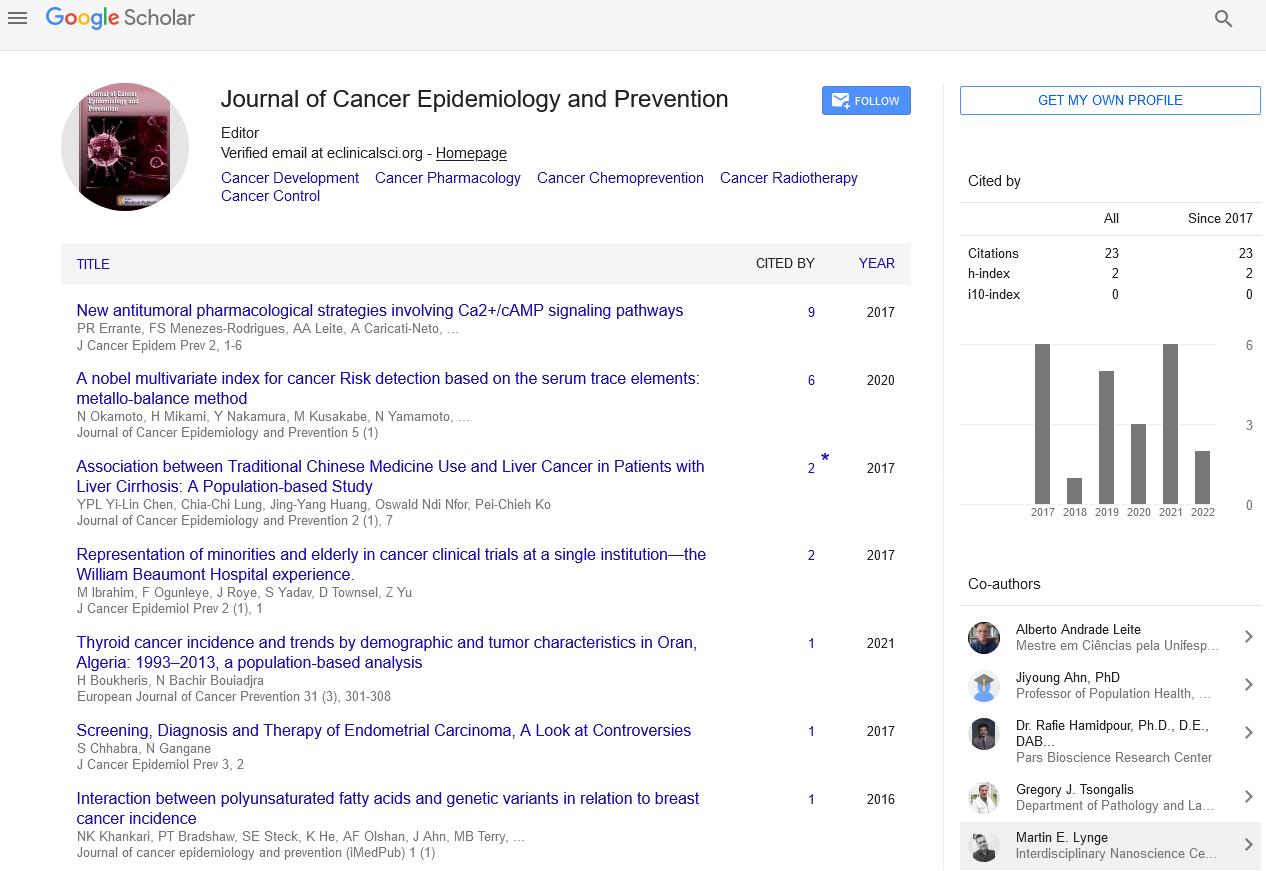Perspective - (2025) Volume 10, Issue 1
Navigating the Long-Term Effects of Chemotherapy Post-Cancer Treatment
Ravi Chandra Reddy*
Department of Radiology, Acharya Nagarjuna University, Guntur, India
*Correspondence:
Ravi Chandra Reddy, Department of Radiology, Acharya Nagarjuna University, Guntur,
India,
Email:
Received: 19-Mar-2024, Manuscript No. IPJCEP-24-19251;
Editor assigned: 21-Mar-2024, Pre QC No. IPJCEP-24-19251 (PQ);
Reviewed: 04-Apr-2024, QC No. IPJCEP-24-19251;
Revised: 24-Mar-2025, Manuscript No. IPJCEP-24-19251 (R);
Published:
01-Apr-2025, DOI: 10.36648/ipjcep.10.1.43
Introduction
Chemotherapy, a cornerstone of cancer treatment, has
undoubtedly saved countless lives by targeting and
eradicating cancer cells. However, the journey through
chemotherapy isn't without its challenges, and for many
cancer survivors, the effects extend beyond the treatment
phase. In this perspective piece, we explore the long-term
effects of chemotherapy, shedding light on the physical,
emotional, and social dimensions that survivors may
encounter post-treatment.
Description
Physical effects: While chemotherapy aims to destroy cancer cells, it can also harm healthy cells in the process, leading to a range of physical side effects that may persist long after treatment ends. These can include:
• Fatigue: Persistent tiredness and lack of energy are common complaints among cancer survivors, often lasting months or even years after completing chemotherapy.
• Cognitive impairment: Some individuals experience "chemo brain," characterized by difficulties with memory, concentration, and multitasking.
• Neuropathy: Nerve damage can result in tingling, numbness, or pain in the hands and feet, affecting balance and coordination.
• Heart and lung problems: Certain chemotherapy drugs can impact the cardiovascular and respiratory systems, increasing the risk of conditions such as heart disease and pulmonary fibrosis.
• Hormonal imbalances: Chemotherapy may disrupt hormone levels, leading to fertility issues, early menopause, or thyroid dysfunction.
Emotional and psychological effects: The emotional toll of chemotherapy extends beyond physical symptoms, profoundly impacting survivors' mental well-being and quality of life:
• Anxiety and depression: Coping with a cancer diagnosis and the rigors of treatment can trigger feelings of anxiety, depression, and fear of recurrence.
• Post-traumatic stress: Survivors may experience flashbacks, nightmares, or heightened stress responses, reminiscent of their cancer journey.
• Body image concerns: Physical changes such as hair loss, weight gain, or surgical scars can affect self-esteem and body image, leading to feelings of insecurity or social withdrawal.
• Survivor's guilt: Some individuals grapple with guilt or survivor's remorse, especially if they've lost loved ones to cancer or if their prognosis is better than others'.
Social and practical challenges: The impact of chemotherapy extends beyond the individual, affecting relationships, work, and daily life:
• Financial burden: The cost of cancer treatment, coupled with potential loss of income due to time off work, can strain finances and lead to financial insecurity.
• Relationship dynamics: Cancer can strain relationships with family and friends, requiring adjustments in communication, support, and caregiving roles.
• Employment issues: Returning to work post-treatment may present challenges due to lingering side effects, reduced stamina, or discrimination in the workplace.
• Survivorship care: Transitioning from active treatment to survivorship requires ongoing support, including surveillance for late effects, counseling, and rehabilitation services.
Navigating the journey forward: Despite the challenges, many cancer survivors find strength, resilience, and newfound appreciation for life in the after math of chemotherapy. Supportive care programs, survivorship clinics, peer support groups, and counseling services can provide valuable resources for addressing the long-term effects of chemotherapy and promoting holistic well-being.
Conclusion
As we reflect on the journey through chemotherapy and its aftermath, let us honor the resilience of cancer survivors and advocate for comprehensive support systems that empower individuals to thrive beyond cancer treatment. Together, let's foster a culture of compassion, understanding, and solidarity, amplifying the voices and experiences of those navigating the complexities of survivorship.
In closing, may we continue to raise awareness, advance research, and champion initiatives that prioritize the longterm health and well-being of cancer survivors, ensuring that no one faces the challenges of chemotherapy alone.
Citation: Reddy RC (2025) Navigating the Long-Term Effects of Chemotherapy Post-Cancer Treatment. Am J Cancer Epidemiol
Prev. 10:43.
Copyright: © 2025 Reddy RC. This is an open-access article distributed under the terms of the Creative Commons
Attribution License, which permits unrestricted use, distribution, and reproduction in any medium, provided the original author
and source are credited.

